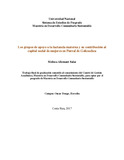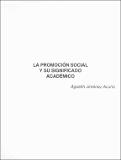| dc.contributor.advisor | Brenes Arce, Laura Catalina | |
| dc.contributor.author | Bonilla Guedes, Lua | |
| dc.date.accessioned | 2022-10-05T20:29:45Z | |
| dc.date.available | 2022-10-05T20:29:45Z | |
| dc.date.issued | 2022-08-24 | |
| dc.identifier.uri | http://hdl.handle.net/11056/24051 | |
| dc.description.abstract | El año de 2016 será recordado como un período de la historia en que Brasil tuvo la
política como protagonista de acciones, tanto a nivel nacional como internacional. El centro
de atención de los distintos medios, y como se centraron en el choque desencadenado por dos
visiones diferentes sobre un importante hecho que involucró al cuerpo social de manera
amplia: la destitución de Dilma Rousseff, mandataria que aunque fue elegida por sufragio
directo y representativo, como lo exigen los saberes y prácticas establecidas por una
democracia, fue destituida sin pruebas.
Desde la recepción de la denuncia, pasando por la instalación del proceso y,
finalmente, por el retiro del Partido de los Trabajadores (PT), se pudo observar en el
transcurso de los capítulos de la investigación que el país suramericano se encontraba ante
un hecho que superó los niveles históricos y periodísticos para ganar espacio en lo discursivo.
Por lo tanto, en esta propuesta se profundizó en el aporte teórico-metodológico de la
semiología, el análisis del discurso y el análisis documental, para comprender cómo se
construyó discursivamente el proceso de acusación en las portadas de la revista VEJA,
después de todo, las condiciones, y los medios se reproducen, predominan y cristalizan los
discursos.
De esta manera, la investigación enfatiza en identificar y analizar la influencia de la
Revista VEJA durante el proceso de acusación de Dilma. Donde se llega a la conclusión
sobre el desempeño de la revista, verificando su cometido como una forma de promoción y
exaltación de algunos nombres entre ellos el de la mandataria, además de críticas exacerbadas
a nombres que no eran de su agrado. Concretizando y confirmando la hipótesis del trabajo,
un golpe de Estado mediático, mismo nombre dado por Eduardo Amorim en su libro O
Quarto Poder. Por último, se resaltan y detectan importantes hallazgos como, la desigualdad
mediática en el proceso político, el posicionamiento machista de la editorial, y la legitimación
que se le brindó al termino “Impeachment” por ser una palabra de origen anglosajón, entre
otros. | es_ES |
| dc.description.abstract | The year of 2016 will be remembered as a period in history in which Brazil had politics as the protagonist of actions, both nationally and internationally. The center of attention of the different media, and how they focused on the clash triggered by two different views on an important event that involved the social body in a broad way: the removal of Dilma Rousseff, a president who, although elected by direct and representative suffrage , as required by the knowledge and practices established by a democracy, was dismissed without evidence. From the reception of the complaint, through the installation of the process and, finally, through the withdrawal of the Workers' Party (PT), it was possible to observe in the course of the chapters of the investigation that the South American country was facing a fact that surpassed the historical and journalistic levels to gain space in the discursive. Therefore, this proposal delved into the theoretical-methodological contribution of semiology, discourse analysis and documentary analysis, to understand how the accusation process was constructed discursively on the covers of VEJA magazine, after all, the conditions, and the media reproduce, predominate and crystallize the discourses. In this way, the research emphasizes identifying and analyzing the influence of VEJA Magazine during Dilma's accusation process. Where the conclusion is reached about the performance of the magazine, verifying its role as a form of promotion and exaltation of some names, including that of the president, as well as exacerbated criticism of names that were not to their liking. Concretizing and confirming the hypothesis of the work, a mediatic coup d'état, the same name given by Eduardo Amorim in his book O Quarto Poder. Finally, important findings are highlighted and detected, such as media inequality in the political process, the macho position of the publisher, and the legitimation given to the term "Impeachment" for being a word of Anglo-Saxon origin, among others. | es_ES |
| dc.description.sponsorship | Universidad Nacional, Costa Rica | es_ES |
| dc.language.iso | spa | es_ES |
| dc.publisher | Universidad Nacional, Costa Rica | es_ES |
| dc.rights | Acceso abierto | es_ES |
| dc.rights.uri | http://creativecommons.org/licenses/by-nc-nd/4.0/ | * |
| dc.subject | BRASIL | es_ES |
| dc.subject | GOLPE DE ESTADO | es_ES |
| dc.subject | PUTSCH | es_ES |
| dc.subject | MOVIMIENTOS SOCIALES | es_ES |
| dc.subject | SOCIAL MOVEMENTS | es_ES |
| dc.subject | RESPONSABILIDAD SOCIAL | es_ES |
| dc.subject | SOCIAL RESPONSABILITY | es_ES |
| dc.subject | ROUSSEFF, DILMA | es_ES |
| dc.title | El golpe de estado mediático y Dilma Rousseff: un análisis semiótico y discursivo de las representaciones sociales en las portadas de la Revista Veja. (En el periodo del 2 de diciembre de 2015 al 2 de diciembre de 2016) | es_ES |
| dc.type | http://purl.org/coar/resource_type/c_7a1f | es_ES |
| dc.description.procedence | Escuela de Sociología | es_ES |



